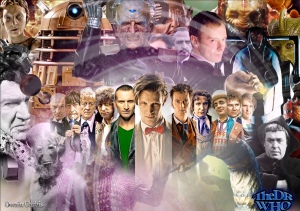The purpose for writing a post on Science and education in Wales is to simply demonstrate that Science should be at the heart of any innovative curriculum. I am not a Scientist however what I am is a primary teacher that is passionate about the teaching of Science. We live in a world that Science has moulded, evolved and created.
The Victorian age was the age of Scientific discovery; “In science and technology, the Victorians invented the modern idea of invention — the notion that one can create solutions to problems, that man can create new means of bettering himself and his environment.” http://www.english.uwosh.edu/roth/VictorianEngland.htm
Therefore Science is the art of invention! Providing pupils with a problem and allowing them the opportunity to develop an answer. Yet it is more than this. Imagine a baby or a toddler discovering everything for the first time. The wonder and awe, the excitement and fun, quite simply the age of curiosity.
“Firstly, we need a national debate about the purpose of science in primary schools. We suggest that the purpose of science in primary school should be to foster a sense of curiosity and positive attitudes in the young child. Do others agree?”
http://www.teachingtimes.com/articles/primary-science-not-working.htm
As classroom practitioners we are guided by a curriculum that can both help and hinder the innovation of pupils and the development. Ofsted states,
“The most important focus for schools is to ensure that pupils are engaged and challenged by their work in science, particularly in scientific investigation and how science works. Students need access to relevant courses that provide them with clear, high-quality pathways through their education, allowing them to attain the highest standards possible, both in the short term and when they progress to further and higher education. The best schools are already doing this.”
An evaluation of science education in England 2007–2010 Ofsted
The key sentence for me is, ‘Pupils are engaged and challenged……’
To be engaged in a Science lesson means to be involved, experiencing new ideas and developing understanding in a practical manner.
In Wales, Estyn has recently released a report explaining,
“In a minority of lessons, pupils are making too little progress in their knowledge and understanding of science or in their writing and numeracy skills. In the few excellent lessons, teachers have high expectations of their pupils. These teachers plan a wide range of stimulating activities that capture pupils’ imagination.”
PLEASE let us celebrate the final phrase,
‘Capture pupils’ imagination.’
Wow, that explains in a nut shell the importance and purpose of Science. However I also agree that a balance is required between knowledge and developing investigative skills,
“The emphasis on investigative skills in the current science National Curriculum orders introduced in 2008 does not help schools to plan progression in scientific knowledge and understanding.”
And as one of four recommendations they conclude,
“provide more opportunities for pupils to pursue their own scientific interests;”
The voice of the child! I remember a few events from my days as a pupil in a primary school. On a Friday, it used to be project day and strangely you were allowed to chose areas of your own interest. I can recall a project on ‘The Wright Brothers‘ and ‘Louis Pasteur‘. The fact that I can recall these projects is testament to the power of the voice of the child. Unusually, I can’t recall many lessons that were wholly led by teachers.
Estyn Thematic Report KS2 & KS3 Science 2013
Science is therefore summed up in a simple word, ICE.
I – imagination to develop innovation
C – curiosity to develop thinking skills
E – engaged in learning to develop solutions to a problem.
By doing this we are developing young adults into innovators, wanting to discover solutions to any given problem. Science is also an excellent means of developing a practical understanding of numeracy and literacy.
Developing the thought of possibility: As a Sci-fi fan, we often take for granted how science has often been inspired by the imagination of creative writers;
USA Today: ‘While we’re waiting for those episodes to air, BBC America has scheduled a fun-sounding special called The Science of Doctor Who. The program includes interviews with show runner Steven Moffatt along with several acclaimed scientists, and it delves into the science-based aspects of the long-running series. So does Doctor Who have a good impact on science? Experts say yes, especially if it influences children.
“Shows like Doctor Who are not meant to be educational … but very often it will inspire particularly young viewers to get interested in science early on,”
notes theoretical physicist Dr. Jim Al Khalili.’ 
Can possibility become reality?
The above graphic demonstrates how many of the ideas prevalent in Star Trek have become a reality for instance, the flip communicator device is easily recognisable as a mobile phone by people today. We might not be able to, ‘beam me up Scottie..’ but that isn’t stopping scientists looking into transporter devices! And my point, science is about making art a reality, making the impossible happen and to not set boundaries. It is about learning through mistakes and refining skills.
To conclude, Science is essential in the Primary classroom as a means of allowing innovation to flourish, curiosity to grow and thus develop an atmosphere of engagement in learning.
Related articles
- Science teaching shortcomings highlighted in new report from Wales’ education watchdog (walesonline.co.uk)
- Make primary maths curriculum ‘more demanding’ and introduce basic algebra at seven, argues study (schoolsimprovement.net)
- Why the UK needs a Quality Mark for primary school science (wellcome.ac.uk)


Fully agree.
I have been working with primary aged children for many years communicating science in a fun / educational way. As a STEM ambassador I provide after school clubs as well. If we can enthuse younger children that may help them as they continue through their education and work life.